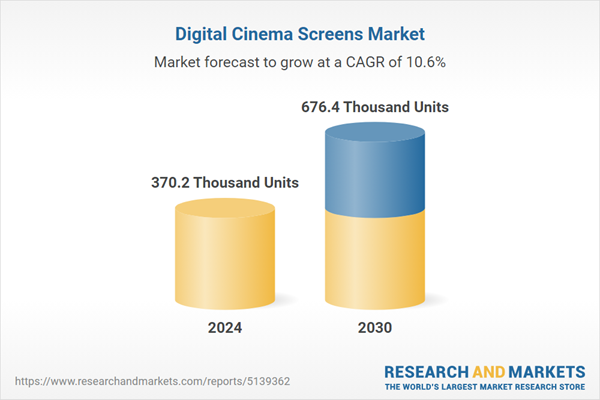Global Digital Cinema Screens Market - Key Trends and Drivers Summarized
What Are Digital Cinema Screens and How Are They Revolutionizing the Movie-Going Experience?
Digital cinema screens represent a significant technological leap in the way films are projected and viewed in theaters. Unlike traditional film projectors that use reels of film, digital cinema screens utilize advanced digital projectors and media servers that enhance picture clarity, color accuracy, and resolution. The cornerstone of this technology is the shift from analog to digital, enabling theaters to showcase movies in formats such as 2K, 4K, and even 8K resolution, providing audiences with unprecedented visual detail and vibrant imagery. Additionally, digital cinema supports 3D film viewing, further immersing the audience into the cinematic world. This evolution in screen technology not only elevates the viewer's experience but also simplifies the distribution and storage of films, as digital movies can be distributed to theaters via hard drives, satellite, and even the internet, reducing the physical and logistical constraints associated with traditional film reels.How Do Digital Cinema Screens Enhance Film Distribution and Exhibition?
The introduction of digital cinema screens has transformed both the distribution and exhibition sectors of the film industry. Digital distribution eliminates the need for physical reels, significantly reducing the cost and complexity of shipping and handling. Distributors can release a movie across hundreds of theaters simultaneously with the push of a button, ensuring that films can reach a broader audience more efficiently. For theater owners, the shift to digital means that switching between different films requires minimal effort and expense, allowing greater flexibility in screening diverse content, including alternative content like live events, concerts, and sports. Moreover, the ease of updating content digitally enables theaters to offer a wider array of viewing options, catering to niche audiences and enhancing customer satisfaction.What Are the Challenges and Opportunities with Digital Cinema Technology?
While digital cinema technology offers numerous benefits, it also presents challenges, particularly in terms of initial setup and maintenance costs. The transition from traditional to digital projection systems involves significant capital investment, as digital projectors and related infrastructure can be costly. Additionally, there is the ongoing expense of maintaining and periodically upgrading digital equipment to keep up with advancing technology and industry standards. However, these challenges are counterbalanced by significant opportunities for theaters. Digital cinema allows for greater programming flexibility and the potential to increase audience engagement through enhanced cinematic experiences. Furthermore, digital screens are pivotal in the adoption of next-generation imaging technologies, such as High Dynamic Range (HDR) and higher frame rates, that filmmakers are increasingly utilizing to push the boundaries of storytelling.What Drives the Growth in the Digital Cinema Screens Market?
The growth in the digital cinema screens market is driven by several factors, including the global expansion of the cinema industry into emerging markets, where new theaters are more likely to adopt the latest digital technologies. The increasing demand for high-quality movie-viewing experiences is also a significant driver, encouraging cinemas to upgrade their systems to digital to meet customer expectations for superior audiovisual performance. Advances in digital screen technology, which continually enhance viewer engagement, along with the integration of interactive and immersive technologies, are further propelling market growth. Additionally, the rise of dynamic pricing models and the ability to screen alternative content afford theaters additional revenue streams, justifying the investment in digital technology. Together, these factors underscore the vibrant and expanding nature of the digital cinema screen market, reflecting its crucial role in the future of theatrical exhibition.Report Scope
The report analyzes the Digital Cinema Screens market, presented in terms of market value (USD). The analysis covers the key segments and geographic regions outlined below.- Segments: Segment (Digital Cinema Screens).
- Geographic Regions/Countries: World; United States; Canada; Japan; China; Europe (France; Germany; Italy; United Kingdom; and Rest of Europe); Asia-Pacific; Rest of World.
Regional Analysis
Gain insights into the U.S. market, valued at 105.2 Thousand Units in 2024, and China, forecasted to grow at an impressive 9.9% CAGR to reach 103.3 Thousand Units by 2030. Discover growth trends in other key regions, including Japan, Canada, Germany, and the Asia-Pacific.Why You Should Buy This Report:
- Detailed Market Analysis: Access a thorough analysis of the Global Digital Cinema Screens Market, covering all major geographic regions and market segments.
- Competitive Insights: Get an overview of the competitive landscape, including the market presence of major players across different geographies.
- Future Trends and Drivers: Understand the key trends and drivers shaping the future of the Global Digital Cinema Screens Market.
- Actionable Insights: Benefit from actionable insights that can help you identify new revenue opportunities and make strategic business decisions.
Key Questions Answered:
- How is the Global Digital Cinema Screens Market expected to evolve by 2030?
- What are the main drivers and restraints affecting the market?
- Which market segments will grow the most over the forecast period?
- How will market shares for different regions and segments change by 2030?
- Who are the leading players in the market, and what are their prospects?
Report Features:
- Comprehensive Market Data: Independent analysis of annual sales and market forecasts in US$ Million from 2024 to 2030.
- In-Depth Regional Analysis: Detailed insights into key markets, including the U.S., China, Japan, Canada, Europe, Asia-Pacific, Latin America, Middle East, and Africa.
- Company Profiles: Coverage of players such as Barco NV, Christie Digital Systems USA, Inc., GDC Technology Ltd., IMAX Corporation, NEC Corporation and more.
- Complimentary Updates: Receive free report updates for one year to keep you informed of the latest market developments.
Some of the 11 companies featured in this Digital Cinema Screens market report include:
- Barco NV
- Christie Digital Systems USA, Inc.
- GDC Technology Ltd.
- IMAX Corporation
- NEC Corporation
- Qube Cinema Technologies
- Sony Corporation
This edition integrates the latest global trade and economic shifts into comprehensive market analysis. Key updates include:
- Tariff and Trade Impact: Insights into global tariff negotiations across 180+ countries, with analysis of supply chain turbulence, sourcing disruptions, and geographic realignment. Special focus on 2025 as a pivotal year for trade tensions, including updated perspectives on the Trump-era tariffs.
- Adjusted Forecasts and Analytics: Revised global and regional market forecasts through 2030, incorporating tariff effects, economic uncertainty, and structural changes in globalization. Includes historical analysis from 2015 to 2023.
- Strategic Market Dynamics: Evaluation of revised market prospects, regional outlooks, and key economic indicators such as population and urbanization trends.
- Innovation & Technology Trends: Latest developments in product and process innovation, emerging technologies, and key industry drivers shaping the competitive landscape.
- Competitive Intelligence: Updated global market share estimates for 2025, competitive positioning of major players (Strong/Active/Niche/Trivial), and refined focus on leading global brands and core players.
- Expert Insight & Commentary: Strategic analysis from economists, trade experts, and domain specialists to contextualize market shifts and identify emerging opportunities.
Table of Contents
Companies Mentioned (Partial List)
A selection of companies mentioned in this report includes, but is not limited to:
- Barco NV
- Christie Digital Systems USA, Inc.
- GDC Technology Ltd.
- IMAX Corporation
- NEC Corporation
- Qube Cinema Technologies
- Sony Corporation
Table Information
| Report Attribute | Details |
|---|---|
| No. of Pages | 179 |
| Published | January 2026 |
| Forecast Period | 2024 - 2030 |
| Estimated Market Value in 2024 | 370.2 Thousand Units |
| Forecasted Market Value by 2030 | 676.4 Thousand Units |
| Compound Annual Growth Rate | 10.6% |
| Regions Covered | Global |









